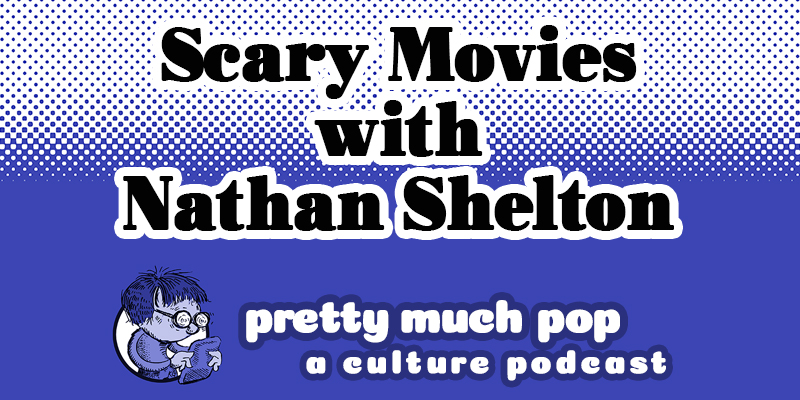What Scares Us, and How Does this Manifest in Film? A Halloween Pretty Much Pop Culture Podcast (#66)

Why do people enjoy being scared by films? How does what counts as frightening in a film actually connect with what scares us in real life, and how does this in turn relate to childhood fears? What’s the deal with “horror” movies that are good but not scary or that are terrible yet still scary in some way? Your hosts Mark Linsenmayer, Erica Spyres, and Brian Hirt are joined by actor/special effects-guy Nathan Shelton (who runs the Frightmare Theatre Podcast) for a Halloween conversation where no one gets a rock.
We present our picks for what scared us as kids: Trilogy of Terror, Invasion of the Body Snatchers (1978), Dark Night of the Scarecrow, and Copycat, and go on about Arachnophobia, The Blair Witch Project, Halloween, Friday the 13th, The Thing, and Nightmare on Elm Street. We also discussion horror aimed at women, body horror, tropophobia, horror movie music, and Stephen King. Finally, we consider the revival in art horror by the likes of Mike Flanagan (Dr. Sleep, Haunting of Bly Manor), Ari Aster (Midsommar, Hereditary), and Robert Eggers (The Witch).
We drew on a break-down on the various elements that make up the horror genre from Matt Glasby, in an article called “The Scariest Films Ever Made and How They Frighten Us.”
For a lengthy academic look at the topic, try “(Why) Do You Like Scary Movies? A Review of the Empirical Research on Psychological Responses to Horror Films” (2019) by G. Neil Martin.
If you don’t mind a key scene from The Thing (1982) being spoiled, check out this landmark grody special effect scene.
Learn more at prettymuchpop.com. This episode includes bonus discussion that you can only hear by supporting the podcast at patreon.com/prettymuchpop. This podcast is part of the Partially Examined Life podcast network.
Pretty Much Pop: A Culture Podcast is the first podcast curated by Open Culture. Browse all Pretty Much Pop posts.
What Scares Us, and How Does this Manifest in Film? A Halloween Pretty Much Pop Culture Podcast (#66) is a post from: Open Culture. Follow us on Facebook, Twitter, and Google Plus, or get our Daily Email. And don't miss our big collections of Free Online Courses, Free Online Movies, Free eBooks, Free Audio Books, Free Foreign Language Lessons, and MOOCs.
from Open Culture https://ift.tt/3mDGEzr
via Ilumina
Comments
Post a Comment